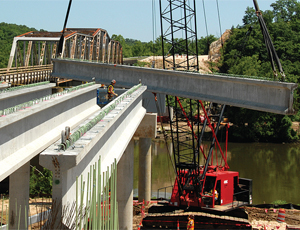The new $8.5-million bridge being built over the Osage River near Tuscumbia, Mo., was the country’s first stimulus-financed project to get under way after President Obama signed the American Recovery and Reinvestment Act on Feb. 17. The new bridge will take the place of a rickety steel-truss bridge that has stood since 1933.


In the months before the ARRA bill was enacted, the Missouri Dept. of Transportation laid the groundwork for several stimulus projects, including the 1,084-ft-long Osage River Bridge, which links two sides of the town of Tuscumbia in central Missouri and carries State Route 17. Dept. of Transportation workers completed design, obtained environmental approvals, got bids from bridge contractors and identified the low bidder.
On Feb. 17, state officials gathered at the bridge and watched a live television feed of the President signing the ARRA bill into law. Then, they awarded the $8.5-million contract to APAC-Kansas Inc., Overland Park, Kan., and a subcontractor’s backhoe bucket broke ground.
| Jobs Created | Direct Labor: 30 Total: 250 |
|---|---|
| ARRA Contract Amount | $213 Million |
The new bridge will meet Missouri’s standard load-bearing capacity. Completion is scheduled for October 2010.
MoDOT estimates construction of the new bridge will support 250 direct and indirect jobs. Rick Zimmerman, area manager for APAC-Kansas’ bridge group, estimates an average of 25 to 30 construction workers from his company and subcontractors will be on-site daily. Nearly all will be from the area, he says. He also says winning this project kept APAC-Kansas from laying off 10 to 15 workers.
The use of ARRA funds has not brought a lot of extra reporting requirements or unusual demands to the project, says Zimmerman. “At the end of the month, we need to report how many hours were worked and what crafts were on the job, but we need to do that for payroll anyway,” he says. “There’s the ‘Buy American’ requirement, but we do that anyway. And the minority-participation requirements are similar to most other jobs, too.”
Zimmerman says APAC-Kansas is currently bidding on three to four more ARRA jobs, averaging $10 million to $15 million each. “We’re now seeing the second wave of ARRA projects that weren’t quite as ready as this job,” he says.

Post a comment to this article
Report Abusive Comment